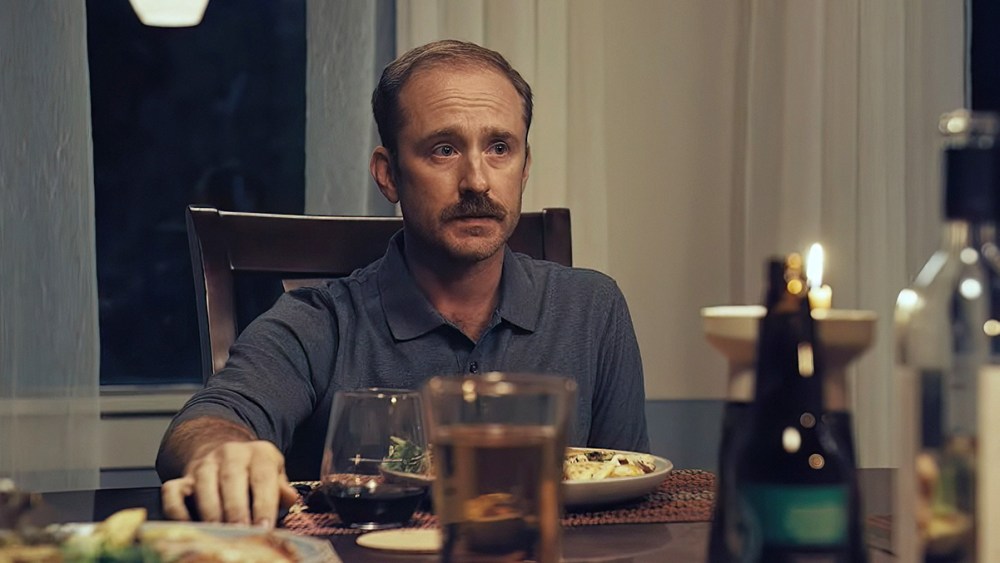Ben Foster Leads a Suburban Fable on Masculinity
To watch Jason Buxton’s “Sharp Corner” feels akin to witnessing a car crash in slow-motion. There’s a bleak inevitability to the proceedings and a cruel voyeuristic streak to how we’re called to not look away. The comparison is apt, of course, considering how central car accidents are to this tale of an even-keeled suburbanite who becomes needlessly obsessed with stopping (or at the very least helping) the inordinate amount of crashes that happen at the treacherous corner street right in front of his new home. Led by an against-type performance from Ben Foster, this languidly paced psychological thriller about domesticity and masculinity may be handsomely mounted but ultimately strikes an all too hollow tone to land its kicker of a final shot.
The promise of a new house is the chance to make a home. That’s what Josh and Rachel (Foster and Cobie Smulders) hope to do when they move into a gorgeous property away from the city with their kid Max (William Kosovic) in tow. But their giddy, giggly happiness as they start to unpack and settle in is short-lived. No sooner are Josh and Rachel happily rekindling the sexual intimacy they’d long neglected than a tire flies in through one of their front windows. A car, it seems, has skidded off the road and hit the tree that graces their front lawn. What initially feels like a freak accident — and which, in turn, freaks out everyone in the family, Max most obvious l y—is soon revealed to be the start of a tragic pattern.
As Buxton’s title all too neatly informs us, this gorgeous house by the woods sits in front of a sharp turn. That titular corner proves to be quite deadly for drunk or otherwise distracted drivers (particularly during inclement weather). When the first crash happens, which does kill a teenager who was driving under the influence, Rachel is ready to rethink this new life and this new home. How can they possibly raise their boy when any screech or brake noise from the street is enough to send them all over the edge? Shouldn’t they sue and move out immediately? By the time a second accident happens, and Josh once more has to helplessly witness someone die in front of him, the couple find themselves grappling with the fallout in decidedly different ways.
Rachel pushes for practical solutions, and for an attendant focus on the psychological impact of these incidents on their young, sensitive kid. But Josh slowly begins to obsess over how he could very well become the savior of anyone who’d end up in a wreck on his lawn. Clearly bored if not outright dissatisfied with his managerial job in the city, Josh is soon consumed with these past tragedies and the future ones he could well help curb. He does research into the lives of those victims. He spends his nights on his front porch, beer in hand, gazing at any passing headlight. Later still, he begins taking CPR classes, readying himself for the moment when he can be the hero he knows he can be. But his obsession soon gets the best of him and the very family he’s trying to keep safe starts to buckle under his casual indifference to their needs.
Foster has long favored playing wounded, sometimes feral characters whose violent tempers and outsized personalities have shone through the actor’s own imposing physical presence. He brought a kinetic intensity to projects like “3:10 to Yuma,” “Hell or High Water” and “Emancipation.” So it’s rather fascinating to witness him playing a mousy, mild-mannered suburban dad here. Sporting a fussy mustache, a balding hairline and a wardrobe as inoffensive as Josh’s own personality (he’s all khaki chinos and sky blue button downs), Foster burrows himself into a man who cannot bring himself to take up space. Despite being married to a therapist, Josh is rather myopic about his own emotional wellbeing and Foster telegraphs that disconnect with a softened tone of voice and a skittish kind of physicality. But he also manages to imbue an insidious kind of threat in that rather affable demeanor.
Much of the terror of this psychological portrait of a man adrift is premised on Josh’s desire to take control of a life that’s quickly spiraling out. It may be Max whom Rachel is most worried about developing PTSD, but it is her husband who becomes slowly unhinged from the needs and responsibilities he’d long been beholden to. With a spare score by Stephen McKeon and sound design that rightly keeps all kinds of noises from the street just outside the house front and center, “Sharp Corner” insists on keeping us trapped in Josh’s headspace — a discomfiting, claustrophobic place to occupy. It’s no spoiler to suggest the picture perfect life he’d hoped to build in this house becomes more and more elusive as his fixation takes over his every day life.
In Buxton and Foster’s hands, Josh is a bleak study in contemporary masculinity. This is an increasingly nerve-wracking fable about the lengths men whose lives are placid if just merely pleasant will go to make themselves feel needed and validated. In 2025, that may well read like an all too obvious psychological portrait of a meek man like Josh. For this is the kind of wreck (vehicular or otherwise) we’ve seen one too many times; that we’ve been forced to rubber neck our way through it is perhaps precisely the point. But that, also, is what makes it both less impactful and less surprising than it hopes to be.


